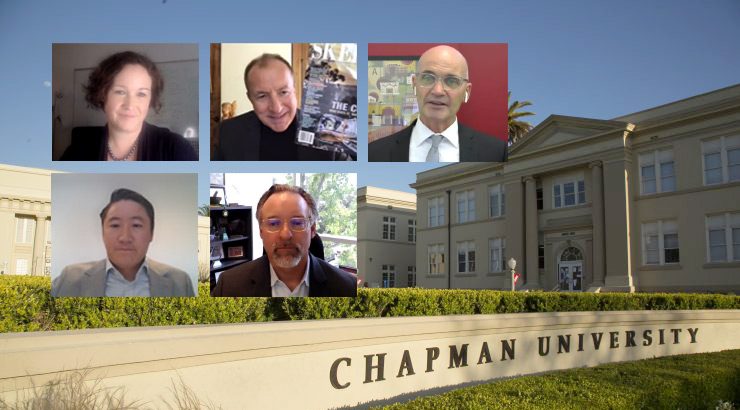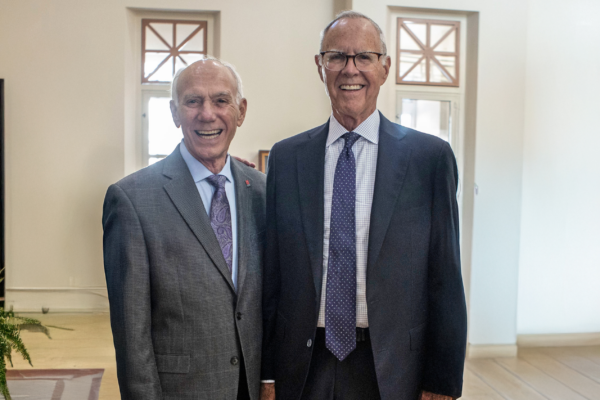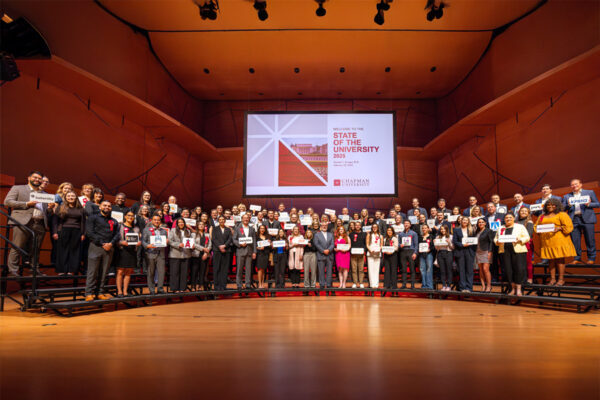Will I need a COVID-19 booster shot? Are there good treatments for the virus now? Can I get natural immunity from an infection?
Those questions were among the topics discussed at Chapman University’s most recent Ask the Experts Virtual Town Hall, a series launched in the early days of the pandemic to bring scientists together to talk with the public about the crisis. The town halls have expanded to include other timely topics, but COVID-19 continues to be a focus.
The following are edited excerpts from the Ask the Experts Virtual Town Hall “Vaccine Hesitancy,” held on Thursday, Sept. 17. Panelists included Jennifer Totonchy, Ph.D., assistant professor, School of Pharmacy; Gary Fong, PharmD., assistant professor, School of Pharmacy; Michael Shermer, Ph.D., Presidential Fellow; and Jeff Goad, PharmD., MPH., professor, School of Pharmacy.
Will I need a COVID-19 booster even though I’m not 65 or at high risk for complications?
Eventually, yes, was the consensus among the research scientists and public health experts. Totonchy explains why.
“Our immune system needs to see that spike protein several times before that response is really, really powerful. This is just how the immune system works. It provides more resources in recognizing and remembering things it has seen multiple times. We’re figuring out as we go how many doses it’s going to take to get robust immunity, but it’s not going to be yearly like influenza vaccines. Flu vaccines are not boosters; they’re a new vaccine every year because flu is different every year. The virus that causes COVID-19 is not like the flu in that way. It doesn’t mutate as fast and it doesn’t have as many tricks up its sleeve. So most likely we’re looking at a three-dose, maybe four-dose maximum, and then everyone will have really durable and long-lasting immunity.”
Can’t we just treat COVID-19, rather than vaccinate?
Fong: “When you get to hospitalization, we have a handful of medications we can use. The impact of these medications on your outcome as a hospitalized patient pales in comparison to what the vaccine does. For Remdesivir, for example, the data tells us that it probably increases the speed of your recovery, but it has little if any impact on decreasing your chances of dying from COVID-19. Dexamethasone is one we’ve used for a while, which decreases your chance of dying, but again maybe a drop of from 40% to 30% in the sickest patients. Whereas vaccines drop it much, much more. So, we have some therapeutics that are available now, but they definitely are nowhere near what a vaccine can do. And all of these drugs are going to have side effects that are going to occur at a higher rate than any with the vaccine.”
Can I get natural immunity from a COVID-19 infection?
Totonchy: “One natural infection is going to be like one vaccination, and it will most likely wane. And remember, this virus really mucks around with the immune system while it’s in there, and during that process it’s actually making the response sub-optimal, whereas a vaccine is designed to create a very specific response and isn’t actively inhibiting or misdirecting the response like the virus is.”
Fong: “We have patients, as many of you have heard of, who are long-haulers, who get COVID and have to deal with symptoms, some mild, some debilitating, for months on end. You probably do have some immunity from an infection, but you’re stuck with the gamble you took.”
Why can’t people be free to choose to not get the vaccine? Why do we need mandates?
Shermer: “People have a misunderstanding of what freedom means. You’ll often hear people say, ‘I should be free to decide whether or not to be vaccinated.’ Well, OK, should you be free to decide to drive on the other side of the road? The biggest obstacle is this misperception of what it means to be free. That’s not what freedom means. Not in a civil society.”
Fong: “The number of people you can help, besides yourself, by getting vaccinated is probably greater than you think. It’s the people around you, your family and loved ones. But it’s also the health care workers and people who work in other [essential services] to consider. The hospitals have been at this for 20 months now. It’s been tough. Health care workers are exhausted. We just get a break and then we get another surge. We have something that is so readily available in these vaccines that can really squash this, and it’s so frustrating to see that we aren’t able to just do this as a collective group. So think about those who you can help by getting vaccinated.”
Can I get a flu shot and the COVID-19 vaccine?
Goad: “Yes, absolutely! One arm for COVID, the other arm for influenza, and your body can handle that just fine. Flu hasn’t gone away. When everybody stays indoors, wears masks and stays away from each other, it goes down, but it will come back. Don’t put off flu vaccination.”
Expert Biographies
Jeff Goad, PharmD., MPH., Professor, School of Pharmacy
Jeff Goad is the Associate dean of Academic Affairs and professor and chair in the Department of Pharmacy Practice at the School of Pharmacy. Goad runs the Travel Clinic at the Student Health Center, and his research program focuses on the social and behavioral aspects of consumer and health care professionals’ decision-making process and outcomes related primarily to immunizations and travel medicine.
Gary Fong, PharmD., Assistant Professor, School of Pharmacy
Gary Fong is an assistant professor of pharmacy practice at the School of Pharmacy who teaches infectious diseases and clinical pharmacokinetics. He practices at Harbor UCLA Medical Center, where he works closely with antimicrobial stewardship and infectious diseases consult services. His research interests include antimicrobial stewardship, clinical pharmacokinetics and antifungal therapies.
Michael Shermer, Ph.D., Presidential Fellow
Michael Shermer is a Presidential Fellow at Chapman University. He teaches the course Skepticism 101, which is affiliated with the First-year Foundations Program. He regularly contributes opinion editorials, essays and reviews to the Wall Street Journal, Los Angeles Times, Science, Nature and other publications. Shermer was the co-host and co-producer of the 13-hour Family Channel television series “Exploring the Unknown.”
Jennifer Totonchy, Ph.D., Assistant Professor, School of Pharmacy
Jennifer Totonchy is an assistant professor of immunology and immunotherapeutics at the School of Pharmacy. She teaches immunology and vaccine formulation in the Doctor of Pharmacy program. She is an accomplished viral immunologist and has worked on host-virus interactions for both DNA and RNA viruses. Her laboratory focuses on infection of human B cells with Kaposi Sarcoma Herpesvirus.




